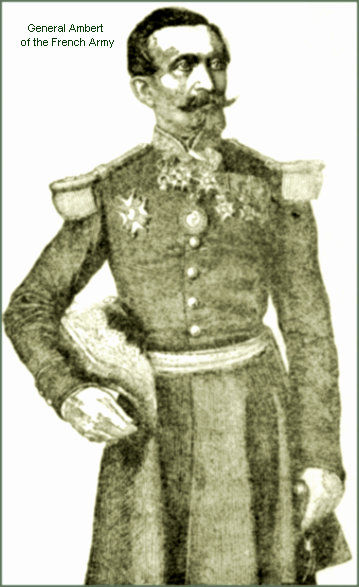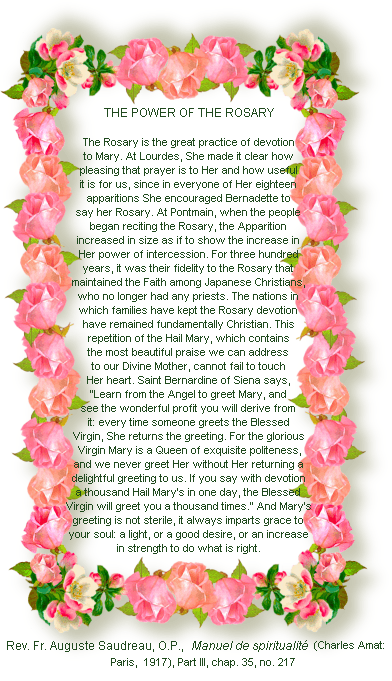

Saved by His Rosary

Taken from Magnificat magazine, January-February 2006.

The following occurrence was related by General Ambert of the French Army.
ONE FINE day in August, our village priest gave us a sermon on prayer. Clad in their festival clothes, the parishioners, people of the plains, most of them farmers, listened reverently to the priest.
I remembered that I had previously been impressed by a similar sermon. More than twenty years had gone by since I had heard Father Lacordaire exclaim in Notre Dame church in Paris, "Prayer issues from the hearts of the poor just as it does from the hearts of kings. It believes it is just as powerful when it soars up from a thatched cottage as when it rises from cedar paneling, when it speaks to God about a piece of bread as when it is concerned with an empire. The rationalist smiles when he sees processions filing by, repeating the same words. The soul endowed with a clearer light will understand that love knows but one word which, unendingly spoken, is never repeated."
The illustrious Dominican's listeners were men of high station: scholars, orators, writers, all fine, educated minds. The village priest was speaking to souls that were no less precious, but these unaffected folks, closer to the earth, needed less elevated forms of oratory.
I even noticed that the village pastor dwelt on thoughts omitted by the famous Dominican. For example, the village priest pursued this idea: "God protects the one who prays."
He said, "Pray in the field and the harvest will be finer. Pray at home and misfortune will not enter in. Prayer is a chain, with one end in our hands and the other in Heaven. Prayer is an alarm with which we call God to our aid at the moment of danger or temptation."
Leaving church, on my way home I followed the path that skirted the woods. Groups of villagers were cutting across the meadow that swayed with ears of wheat, ripe for the harvest.
A man was walking in front of me, and soon I caught up with him. My narrative obliges me to introduce you to this man.
After having served as a sergeant in the 42nd Infantry Regiment, Jacques Orval had come home to his father's farm in the district of Chartres. From his garden he could see the magnificent cathedral and the city that surrounded it. Jacques Orval used to compare the houses of Chartres, grouped around the church, to little chicks sheltered under their mother's wing. Farmers have their moments of poetry, too.
As courageous in farming as he had been in war, Jacques was a solid son of the Beauce [1], serious and hardworking.
When I caught up with him I said, "say, now, Sergeant, you heard the sermon. I imagine you'll be praying from now on!"

"I've ben praying for a long time," Orval replied, "and I know better than anyone how well prayer protects us. That's one story I'll have to tell you someday."
I insisted on his telling it at once, so the Sergeant lit his pipe and related the following story:
I was in Rome with my regiment when the War of 1870 broke out. We returned to France and served as the nucleus of the 13th Army Corps being formed by General Vinoy. On the day of the Battle of Seday of the Battle of Sedan we were in Mézières; we heard the cannons roar. After General Vinoy's admirable retreat, our brigade, formed out of the 35th and 42nd Regiments, became the core group of the army defending Paris.
After many encounters, my battalion was sent to Vitry. We built fortifications and defensive works, but our workers were being harassed by enemy surveillance. The enemy had chosen the best Prussian and Bavarian marksmen to slip, man by man, into the slightest folds in the terrain, and hide behind hedges or lie in holes dug in the ground. They would observe our labors and movements, take a sure shot and then vanish out of sight.
Our commander wanted to oppose this sinister tactic with something he called an anti-mine operation. He called for volunteers, practiced marksmen who had no fear for their lives. I was accepted for the task and took my place among these condemned men.
We were to crawl a certain distance, observe the enemy without being seen and shoot only to kill, not just to burn powder. The commander's final recommendation was to fell as many as possible in order to discourage them from continuing this tactic. "Be all eyes and ears,"
said the commander, "and don't forget that you will be surrounded by strapping lads who will not spare you."
Just before dawn I went down into the bed of a dried-up stream and followed its winding course, crawling on my hands and knees with my rifle on a sling and a piece of sourdough in my pocket. A belt around my waist held my lieutenant's revolver and field glasses. A canteen full of coffee completed my provisions of war. We were forbidden to smoke, stand or make the slightest noise.
When I reached a big tree surrounded by brush, I halted and chose this point as my observation post. I dug a hole in the ground with my bayonet, and using the top of the bank as a rampart, capped it with dry grass and made openings in the rampart so that I could see without being seen. Everything was as small as I could make it.
The cannons were roaring from their forts in Ivry and Charenton. I could hear gunfire crackling out of Gare-aux-Boeufs. Shells coming from the direction of Moulin-Saquet went whistling over my head and exploded all around. An hour went by, and then another. I was starting to lose hope in my mission when on the path down in the hollow, behind a tree, I thought I saw a hand that kept appearing and disappearing.
Soon there was no doubt: the enemy was there, very close by. I pulled out my field glasses, and with a shiver of fear I saw the head and hands of a man, so close that I shrank back instinctively. The man did not see me, since he was non-chalantly scratching the ground with a piece of wood. Sitting on the ground, leaning his head on his left arm, and legs stretched out, he seemed to have forgotten his mission as a lookout. His head and body vanished for a few seconds and then reappeared.
Still young enough to be beardless, his blond hair cut short, this Bavarian had an honest face. Under his uniform, it was not hard to see a country boy who was certainly thinking of home. I really regretted the fact that I would have to kill him like a rabbit in its hole.
I made ready to do so, however. With gun in hand, right knee on the ground and rifle butt at my shoulder, I waited for my young man to expose himself. I wanted to hit him square in the chest so he wouldn't suffer.
I waited, totally still, eye on the target. The Bavarian stretched his neck and took a long look around, without pausing at the point I was holding. Having discovered nothing, he pulled out a little leather bag, laid it on his knees and opened it. With his right hand he withdrew something I couldn't make out. I put down my gun to have a look at it with the field glasses.
The Bavarian was holding a Rosary in his hands. Rising to his knees, he made the Sign of the Cross. With this movement, he was entirely in the open.
My fighting instinct made me pick up my rifle again, and I took aim at the man. At the end of my rifle barrel, I could see his motionless head slightly bowed, his eyes raised to Heaven. Prayer fell from his lips as the Rosary beads slid through his fingers.
I don't know what happened to me then, but my Christian blood was boiling in my veins. I believe I saw rays of light coming down from Heaven onto the forehead of that man in prayer. A holy vision overwhelmed me entirely, and the rifle dropped from my hands ...
Jacques, that excellent farmer, interrupted his story at this point. Then, after a moment of silence, he concluded:
I'm sure he returned home without ever knowing that the Rosary had saved his life. After the Bavarian had gone, at the very moment I was leaving, two bullets whistled past my ear. I turned around quickly but could not see where they had come from. Surely the man's prayer had protected me, too.
Sitting by the campfire that night, I wondered if I had had the right to spare an enemy like that. To appease my conscience, I went to the fighting at La Hay on November 20th, and at Choisy-le-Roi on the 30th. I did my part generously and paid my debt to my country. That evening, having been wounded, I was evacuated by ambulance. I received the military medal. (end of the narration by Jacques Orval, related by General Ambert)
May this story help us to be more faithful to the holy practice of saying our Rosary every day. And if we are ever tempted to neglect it, let us remember the story of the Bavarian saved by his Rosary.
Only in Heaven did that soldier ever learn how his Rosary saved his life. And only in Heaven will we too know how we were spared physical and spiritual dangers by the Hail Mary's of the Rosary.
You who see in the Rosary only a devotion for women, believe that the Blessed Virgin protects those who pray to Her. Invoke Her by saying your Rosary to Her every day, or one decade, or at least three Hail Mary's.
SOURCES: Au Pays de l'Honneur; remembrances and narratives by General Ambert, deputy laureate of the French Academy (Oeuvre de Saint-Charles de Grammont: Bruges), pp. 93-99; L'Écho Paroissial de Saint-Pierre (Beauvais), October 1928, pp. 343-344.
1. The Beauce is an historical region in northern France, located between the Seine and Loire rivers. It now comprises the Eure-et-Loir département and parts of Loiret and Loir-et-Cher. The region shared the history of the county of Chartres, which is its only major city.
 E-Mail
E-Mail
HOME-----------------------MARY'S DIRECTORY
www.catholictradition.org/Tradition/saved.htm